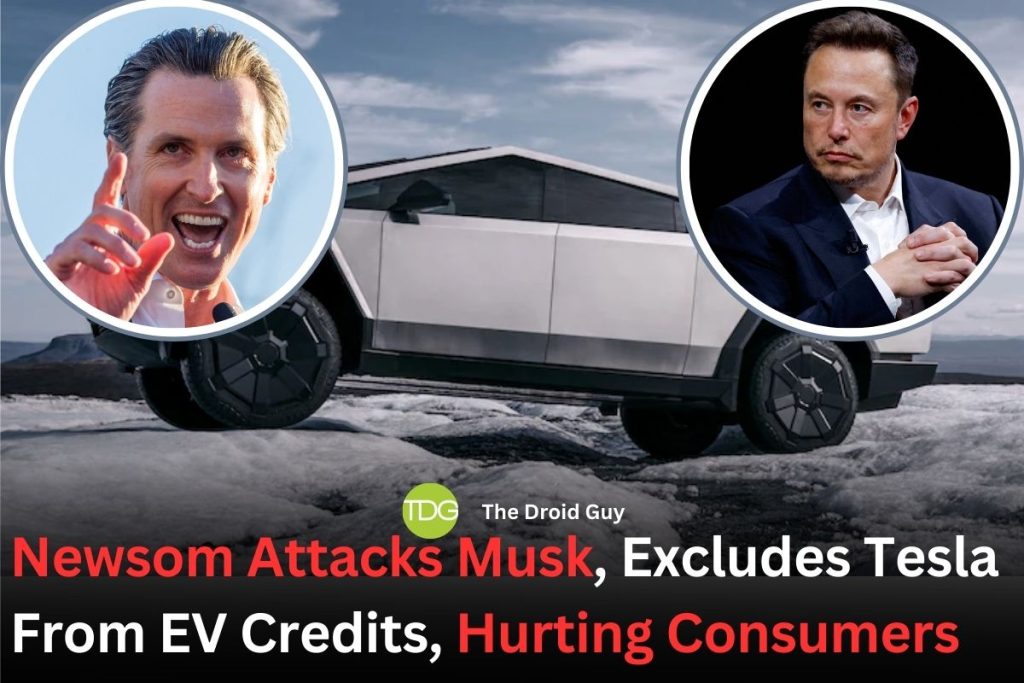Newcom’s Policies Against Tesla And Musk Politicize EV Credits, Ultimately Harming Consumers’ Access To Incentives
California’s electric vehicle (EV) landscape is undergoing significant changes, particularly with the recent proposals from Governor Gavin Newsom that could severely impact Tesla, the state’s last major car manufacturer. The governor’s plan to exclude Tesla from state consumer rebates aims to foster competition among EV makers, a move that many critics argue is politically motivated and detrimental to consumers and the state’s economy.

The Proposal and Its Implications
On November 25, 2024, Governor Newsom announced a proposal to revive a state incentive program for EV buyers, contingent on the potential repeal of a federal subsidy by President-elect Donald Trump. This proposal includes market-share limitations that would specifically exclude Tesla’s vehicles from receiving these rebates.
Newsom’s administration claims this initiative is designed to create “market conditions for more of these car makers to take route,” but it raises serious concerns about its true intent and impact on consumers.
Elon Musk responded sharply on social media platform X, stating, “Tesla is the only one making cars in California, so this move hurts jobs in California.”
His statement underscores a critical point: Tesla has been a significant job creator in the state, employing approximately 47,000 people directly and supporting many more indirectly through its extensive supply chain. By excluding Tesla from these incentives, the state risks jeopardizing thousands of jobs at a time when economic stability is crucial.
A Political Agenda?
Critics argue that Newsom’s proposal reflects a broader trend of politicizing California’s automotive industry at the expense of consumer choice and economic growth. The exclusion of Tesla from rebate programs appears to be less about fostering competition and more about sidelining a company that has frequently clashed with state leadership.
Musk’s previous criticisms of California’s handling of the COVID-19 pandemic and his decision to relocate Tesla’s headquarters to Texas have only intensified tensions between him and state officials.
This political maneuvering raises questions about the motivations behind such policies. Are they genuinely aimed at benefiting consumers and promoting competition, or are they retaliatory actions against a company that has been vocal about its grievances with the state’s regulatory environment?
The potential fallout from these decisions could lead to reduced job opportunities and higher prices for consumers who rely on Tesla’s innovative products.
Economic Impact
Tesla’s contributions to California’s economy cannot be overstated. The company has invested over $5 billion in local facilities since 2016 and has consistently paid above-average wages, significantly boosting local economies.
For every 100 direct jobs created by Tesla, an estimated 50 additional jobs are supported in the supply chain. This economic ripple effect is vital for maintaining California’s position as a leader in the EV market.
By excluding Tesla from rebate eligibility, California risks undermining its own economic stability. With other manufacturers still ramping up their production capabilities, Tesla remains a critical player in maintaining jobs and innovation within the state.
As Musk pointed out, this exclusion could ultimately hurt not just Tesla but also the broader workforce dependent on its success.
Governor Newsom’s recent proposal raises significant concerns regarding its implications for both consumers and the automotive industry in California. By politicizing EV incentives and targeting Tesla specifically, state leaders may be prioritizing political agendas over economic realities.
As California navigates this complex landscape, it must consider the long-term effects of its policies on job creation, consumer choice, and its standing as a leader in electric vehicle manufacturing. The stakes are high, and the outcome will undoubtedly shape the future of not just Tesla but also the broader automotive industry in California.